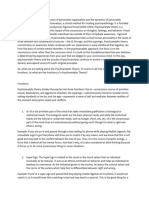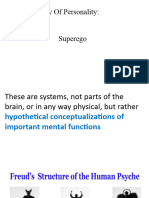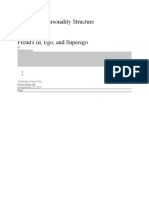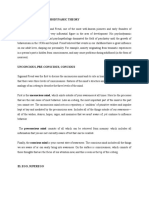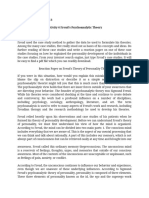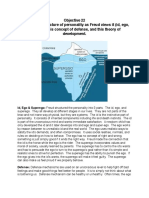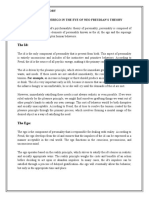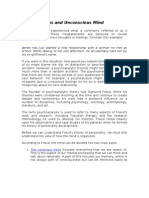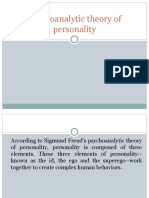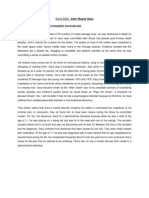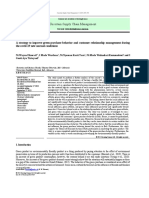iBT Q4 09
iBT Q4 09
Uploaded by
erwincapiliCopyright:
Available Formats
iBT Q4 09
iBT Q4 09
Uploaded by
erwincapiliOriginal Title
Copyright
Available Formats
Share this document
Did you find this document useful?
Is this content inappropriate?
Copyright:
Available Formats
iBT Q4 09
iBT Q4 09
Uploaded by
erwincapiliCopyright:
Available Formats
iBT_Q4_09
Directions: In this question, you will read a short passage and then listen to a talk on the same academic topic. You will then answer a question about them. After you hear the question, you will have 30 seconds to prepare your response and 60 seconds to speak. You have 45 seconds to read the passage.
Sigmund Freud The terms id, ego, and super ego were coined by the German psychologist Sigmund Freud. For Freud, these terms described the division between conscious and unconscious. The id, being fully unconscious, deals with primal drives and urges, such things repressed by the consciousness. The ego, being mostly conscious, deals with external reality and everyday actions. And the super ego, which is partly conscious, is the moral judge that works internally as a conscience.
Narrator: Now listen to part of a talk about psychology.
Copyright 2007 English 1 on 1 Corp. All rights reserved. No reproduction without expressed written permission of English 1 on 1.
Professor: Freud coined the terms id, ego, and super ego in reference to our psyche and how our brain makes decisions. The id is responsible for our basic impulses and drives such as hunger, thirst, sex, and aggression. We can think of a very young child as completely id driven. When the child wants something, it must have it. It ignores morals, logic, time, and being told no. It will stop at nothing until its needs are satisfied. The super-ego stands against the id as its moral superior. The super-ego is the conscience that thinks of social appropriateness. The laws of society and what is morally acceptable come into play with the super-ego. It keeps the id in check. If something is socially wrong or legally wrong to do, for example, steal from someone, it is the super ego that will remind us this is not the best path to take. The natural balance between these two is the ego. The ego mediates between what the id wants and what the super-ego says is ok or not. The ego tries its best to satisfy the wants of the id, while at the same time minimizing the consequences to the individual. Its main priority is the safety of this individual.
Narrator: Now get ready to answer the question. Narrator: The professor describes the functions of the three divisions of psyche. How do the id, ego, and super-ego function in our everyday decision making? Use examples and details in your response.
Copyright 2007 English 1 on 1 Corp. All rights reserved. No reproduction without expressed written permission of English 1 on 1.
Freud developed the terms id, ego and super-ego to describe how we make decisions. The id ummis responsible for our basic impulses such as umthirst and hunger. A child is id drivenumbecause it will not stop until it gets what it needs. The super-ego keeps the id in place by reminding the id ofummwhat is appropriate or not umm in society. The balance between the id and the super-ego is the ego. The ego is in the middle between what the id wants and what the super-ego says is OK. ummThe ego always wants to keep the individual safe.
Copyright 2007 English 1 on 1 Corp. All rights reserved. No reproduction without expressed written permission of English 1 on 1.
You might also like
- Self Regulation Vs CoregulationDocument3 pagesSelf Regulation Vs CoregulationJohn DoeNo ratings yet
- Freud's Structural and Topographical Models of PersonalityDocument3 pagesFreud's Structural and Topographical Models of PersonalityHarjeet Kaur100% (2)
- (Mary de Young) Madness An American History of MeDocument303 pages(Mary de Young) Madness An American History of MeVigneshwaran Vikki100% (2)
- Id Ego SuperegoDocument7 pagesId Ego SuperegoSupantha Bhattacharyya100% (1)
- Little Book Byron KatieDocument22 pagesLittle Book Byron KatieAngieBB100% (6)
- Gilbert Worthy Performance 6boxes PDFDocument6 pagesGilbert Worthy Performance 6boxes PDFbbking44No ratings yet
- Prelims: Philosophical Theories of The SelfDocument4 pagesPrelims: Philosophical Theories of The SelfJake Francis JarciaNo ratings yet
- ORALDocument3 pagesORALrollenjhoNo ratings yet
- Ego and Defence MechanismDocument9 pagesEgo and Defence MechanismJananee RajagopalanNo ratings yet
- Freud's Theory of PersonalityDocument4 pagesFreud's Theory of Personalityyy69225No ratings yet
- Sigmund Freud Psychoanalytic Theory of PersonalityDocument3 pagesSigmund Freud Psychoanalytic Theory of Personalityoumeela100% (3)
- Pyschoanalyss by Segmund FreudDocument25 pagesPyschoanalyss by Segmund FreudzhytottNo ratings yet
- 2.2 ZONE: Personality Structure Freud's Id, Ego, and SuperegoDocument8 pages2.2 ZONE: Personality Structure Freud's Id, Ego, and SuperegoJco EmNo ratings yet
- Advocacy Skills-3Document10 pagesAdvocacy Skills-3Riya JudeNo ratings yet
- Sigmund FreudDocument11 pagesSigmund FreudAbdulHamid GomampongNo ratings yet
- Sigmond Freud-NotesDocument7 pagesSigmond Freud-NotesNarayanan ShankaraNo ratings yet
- Ego, Id and SuperegoDocument3 pagesEgo, Id and SuperegoMartha ShinganoNo ratings yet
- Freud'S Personality ComponentsDocument2 pagesFreud'S Personality ComponentsAra Mae MaglasangNo ratings yet
- Ayala C. Caracter BEED II-B MIDTERM FINAL LALADocument22 pagesAyala C. Caracter BEED II-B MIDTERM FINAL LALAAYALA CARACTERNo ratings yet
- Theories and Approaches of Counseling and PsychotherapyDocument39 pagesTheories and Approaches of Counseling and PsychotherapyMWENDA JUSTINE E221/21605/2021No ratings yet
- Ayala Caracter BEED II-B CAA Act. 6Document5 pagesAyala Caracter BEED II-B CAA Act. 6AYALA CARACTERNo ratings yet
- Psychoanalytic-WPS OfficeDocument1 pagePsychoanalytic-WPS OfficeLey ComoraNo ratings yet
- Psycho Analythic TheoryDocument4 pagesPsycho Analythic TheoryKarla Jenngvev Aracan OrdanNo ratings yet
- The structure of personality. FreudDocument5 pagesThe structure of personality. Freudriseva2002No ratings yet
- PsychoanalysisDocument11 pagesPsychoanalysisEloisa Marie Enriquez BontilaoNo ratings yet
- Prashant PsychologyDocument11 pagesPrashant PsychologyMohita SuryavanshiNo ratings yet
- Objective 22 Describe The Structure of Personality As Freud Views It (Id, Ego, Superego), His Concept of Defense, and This Theory of DevelopmentDocument2 pagesObjective 22 Describe The Structure of Personality As Freud Views It (Id, Ego, Superego), His Concept of Defense, and This Theory of Developmentapi-316591997No ratings yet
- Freud's TheoryDocument6 pagesFreud's Theoryjust passing byNo ratings yet
- Educational Psychology - Module 3 PDFDocument25 pagesEducational Psychology - Module 3 PDFMulenga Levy ChunguNo ratings yet
- Id, Ego and Super-EgoDocument3 pagesId, Ego and Super-EgoJose Li ToNo ratings yet
- Freud's Psychoanalytic Theory: Pleasure Principle"Document29 pagesFreud's Psychoanalytic Theory: Pleasure Principle"Psych MajorNo ratings yet
- The Id:: Neo Freudian'S Theory Id Ego and Superego in The Eye of Neo Freudian'S TheoryDocument3 pagesThe Id:: Neo Freudian'S Theory Id Ego and Superego in The Eye of Neo Freudian'S TheorySyed Raza Imam TirmaziNo ratings yet
- Lecture 5Document34 pagesLecture 5Faisal AlNo ratings yet
- Id, Ego, Superego: The Structural Model of PersonalityDocument19 pagesId, Ego, Superego: The Structural Model of PersonalityErica Ayerde100% (1)
- (DISS 5) PSYCHOANALYSIS Students'Document2 pages(DISS 5) PSYCHOANALYSIS Students'Andrei100% (1)
- Social Issues Personality AssignmentDocument6 pagesSocial Issues Personality Assignmentalibriana933No ratings yet
- Sigmund Freuds Concept of SelfDocument6 pagesSigmund Freuds Concept of SelfTina ValdezNo ratings yet
- El Yo, El Ello y El Super YoDocument8 pagesEl Yo, El Ello y El Super YoModotti AidaNo ratings yet
- Giving A Character Depth by Psychoanalystic TheoriesDocument6 pagesGiving A Character Depth by Psychoanalystic TheoriesrishiNo ratings yet
- PsychoanalysisDocument16 pagesPsychoanalysismusicatwork100% (1)
- Psychology ProjectDocument13 pagesPsychology Projectshashank patelNo ratings yet
- Psychoanalytic FreudDocument89 pagesPsychoanalytic FreudK. Rubina100% (1)
- Freudian TheoryDocument5 pagesFreudian TheoryshahrozeNo ratings yet
- Id Ego and Super Ego by FreudDocument3 pagesId Ego and Super Ego by FreudFrancisco Felipe Bacang100% (2)
- Id, Ego and Superego: What Is The Id (Or It) ?Document4 pagesId, Ego and Superego: What Is The Id (Or It) ?Carl Joseph AngelesNo ratings yet
- RVA-UNIT-5.1Document5 pagesRVA-UNIT-5.1Ivy VillaNo ratings yet
- Psychoanalytic Theory of PersonalityDocument12 pagesPsychoanalytic Theory of PersonalityBárbara Núñez de CáceresNo ratings yet
- Psychoanalytic Theory of PersonalityDocument11 pagesPsychoanalytic Theory of PersonalityPrashantNo ratings yet
- Theories of SocializationDocument11 pagesTheories of SocializationAqdas RehmanNo ratings yet
- Id, Ego SupergoDocument6 pagesId, Ego SupergoNnil GnuamNo ratings yet
- The Id, Ego and The Superego - Sigmund FreudDocument6 pagesThe Id, Ego and The Superego - Sigmund FreudsiddhantkhandelwalNo ratings yet
- Psychodynamic PerspectivesDocument15 pagesPsychodynamic Perspectivesmana070201No ratings yet
- STS Freud TheoryDocument3 pagesSTS Freud TheoryChris Thel MayNo ratings yet
- Id, Ego, and Superego - Understanding Freud's TheoryDocument5 pagesId, Ego, and Superego - Understanding Freud's TheoryRyan Christopher C. LimNo ratings yet
- Module 3 Lesson 1Document9 pagesModule 3 Lesson 1clarisseNo ratings yet
- Chapter 14 Lesson 2 Psychoanalytic Theories WorksheetDocument4 pagesChapter 14 Lesson 2 Psychoanalytic Theories Worksheetnoralyvega9No ratings yet
- Personality: Freud Psychoanalytic Theory: Defense MechanismsDocument10 pagesPersonality: Freud Psychoanalytic Theory: Defense MechanismsAadil JuttNo ratings yet
- Freud's Theory of Personality - Id, Ego, and SuperegoDocument5 pagesFreud's Theory of Personality - Id, Ego, and SuperegoRyan Christopher C. LimNo ratings yet
- Reading Material-L-5 & L-6Document9 pagesReading Material-L-5 & L-6Siddharth soniNo ratings yet
- Id, Ego, and Superego - Freud's Elements of PersonalityDocument5 pagesId, Ego, and Superego - Freud's Elements of PersonalityRyan Christopher C. LimNo ratings yet
- Structure of PersonalityDocument4 pagesStructure of PersonalityZoha ImranNo ratings yet
- Boyet B. Aluan Boyet B. Aluan Boyet B. Aluan: Psychoanalytic TheoryDocument50 pagesBoyet B. Aluan Boyet B. Aluan Boyet B. Aluan: Psychoanalytic TheoryJan AbigailNo ratings yet
- How to Analyze People: The Keys to Understanding the Human Mind, Psychology, Behavior and Body LanguageFrom EverandHow to Analyze People: The Keys to Understanding the Human Mind, Psychology, Behavior and Body LanguageRating: 5 out of 5 stars5/5 (1)
- Drug Directions & Dosages Abbreviations: Abbreviation Derivation MeaningDocument1 pageDrug Directions & Dosages Abbreviations: Abbreviation Derivation MeaningerwincapiliNo ratings yet
- Radial Shockwave Therapy: Physical Effects of Radial Pressure WavesDocument2 pagesRadial Shockwave Therapy: Physical Effects of Radial Pressure WaveserwincapiliNo ratings yet
- Whatever You Think Think The OppositeDocument77 pagesWhatever You Think Think The Oppositeerwincapili80% (5)
- UltrasoundDocument18 pagesUltrasounderwincapiliNo ratings yet
- Advice For Medical StudentsDocument3 pagesAdvice For Medical StudentsTharany SureshkumarNo ratings yet
- The Emotional Intelligence of Leaders (Goleman, 1998)Document7 pagesThe Emotional Intelligence of Leaders (Goleman, 1998)Eunice MakNo ratings yet
- PR2 Lara, Samuel, Yvonne, Vallerie, DanielDocument5 pagesPR2 Lara, Samuel, Yvonne, Vallerie, DanielSamuel CerezoNo ratings yet
- First Grading Unit Test SHS 2016Document4 pagesFirst Grading Unit Test SHS 2016Ariel NubeNo ratings yet
- Department of Education: Republic of The PhilippinesDocument4 pagesDepartment of Education: Republic of The PhilippinesLee Onil Romat SelardaNo ratings yet
- Why Do South Korean Students Study HardDocument10 pagesWhy Do South Korean Students Study HardJonathan JarvisNo ratings yet
- CaseworkkkkDocument3 pagesCaseworkkkkMervin Paul AlonzoNo ratings yet
- Cidam English 7 TemplateDocument3 pagesCidam English 7 TemplateEzekiel Rabadon0% (1)
- Music Detailed Lesson PlanDocument5 pagesMusic Detailed Lesson PlanDesiree Fae Alla100% (1)
- Juno Reaction PaperDocument2 pagesJuno Reaction PaperJulienne Sanchez-SalazarNo ratings yet
- Academic and Social-Emotional LearningDocument32 pagesAcademic and Social-Emotional LearningSisa Ruwan100% (1)
- Topic: Investigating Into Human Based Decision Making (Intuition and Instinct) When Venturing Into New Markets: A Case of Pacific Cigarette CompanyDocument32 pagesTopic: Investigating Into Human Based Decision Making (Intuition and Instinct) When Venturing Into New Markets: A Case of Pacific Cigarette CompanyfanwellsibandaNo ratings yet
- Ekawati Et Al., 2023Document10 pagesEkawati Et Al., 2023Aplicacion MovilNo ratings yet
- Ask & Receive: A & R Protocol - Using Felt Sense To Guide TreatmentDocument2 pagesAsk & Receive: A & R Protocol - Using Felt Sense To Guide TreatmentKB100% (1)
- Estj PersonalityDocument10 pagesEstj PersonalityMelissaNo ratings yet
- Organisational Behavior Book Review: Review By: Mandar Navare Roll No: M-10-34Document9 pagesOrganisational Behavior Book Review: Review By: Mandar Navare Roll No: M-10-34Mandar NavareNo ratings yet
- Effect of Fairness and Knowledge On Tax Compliance For Micro, Small, and Medium Enterprises (MSMEs)Document8 pagesEffect of Fairness and Knowledge On Tax Compliance For Micro, Small, and Medium Enterprises (MSMEs)Taruna Putra DirgantaraNo ratings yet
- Individual TherapyDocument2 pagesIndividual TherapyMarwa ElsheikhNo ratings yet
- Survey Design: Teri Peterson Peteteri@isu - EduDocument16 pagesSurvey Design: Teri Peterson Peteteri@isu - EduKevinThomasNo ratings yet
- Organization Development and Reinventing The Organization: 1 Slide 1Document38 pagesOrganization Development and Reinventing The Organization: 1 Slide 1Snehal Sunil Darji100% (1)
- PRODUCTIVE pedaGOGYDocument22 pagesPRODUCTIVE pedaGOGYbryan sumookNo ratings yet
- Abnormal Psych AssignmentDocument4 pagesAbnormal Psych AssignmentKrizza MaeNo ratings yet
- J. Steiner - The Aim of PsychoanalysisDocument14 pagesJ. Steiner - The Aim of PsychoanalysisHans CastorpNo ratings yet
- Tqs Reflection 3Document2 pagesTqs Reflection 3api-534905186No ratings yet
- Contribuciones de Shneidman Al Pensamiento SuicidaDocument21 pagesContribuciones de Shneidman Al Pensamiento SuicidaJuan Carlos Jaramillo100% (1)
- Rising Strong Reading GuideDocument9 pagesRising Strong Reading GuideGabiSouzaNo ratings yet







